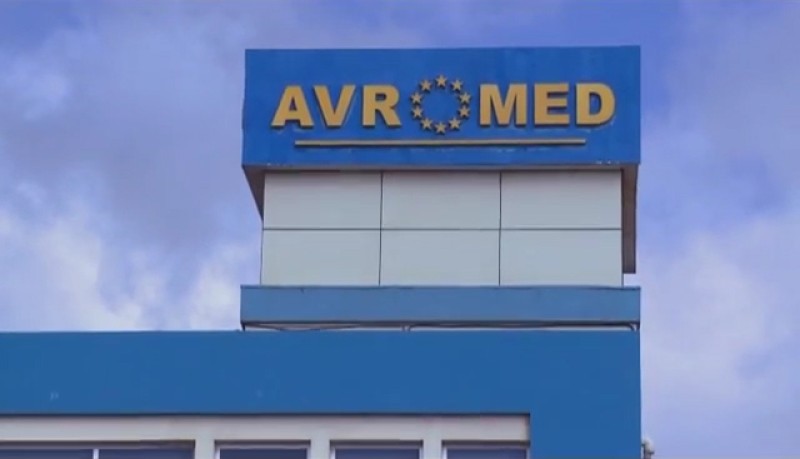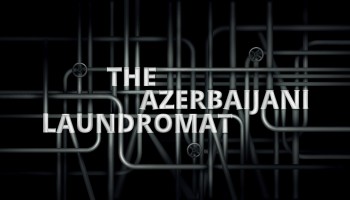Note: this Article was the subject of a libel claim by Javanshir Feyziyev which was settled on agreed terms. Mr Feyziyev categorically denies involvement in money laundering or any unlawful activity. (See “the Agreed Statement”)
AvroMed Company LLC, one of the largest pharmaceutical companies in Azerbaijan, has the same name as the second-biggest beneficiaries of the Azerbaijani Laundromat, which received more than US$ 138 million between August 2013 and December 2014.
The money was sent by two of the four British shell companies, linked to Azerbaijan’s ruling family, that are at the center of the Azerbaijani Laundromat scheme. (See: Core Companies)
AvroMed was co-founded and, until 2010, openly managed by Javanshir Feyziyev, a member of parliament who is close to the first family, with which he has business ties. He is considered a trusted associate of President Ilham Aliyev and is instrumental in Azerbaijan’s efforts to lobby the European Union (EU). The country works aggressively on the international level to deflect criticism of its poor human rights record. (See: The Influence Machine)
In response to reporters’ questions, Shahla Mahmudova, a deputy CEO of AvroMed, said that the company has “never, in its entire history, made any payments nor had receipts outside of its purely commercial activities.”
She would not comment on the specific transactions which appear to have been sent to the company.
If true, it’s not clear how the millions apparently received by AvroMed could be connected to any of its legitimate business. The company has no offices or representatives in the Baltic countries where the payments were made.
Money-laundering operations like the Laundromat are common in the former Soviet republics and often deeply integrated into their economies. They may be used by government officials, organized crime groups, or even ordinary businesses for a variety of purposes, such as disguising the origins of money, evading taxes, or paying bribes.
It is not clear where the money ultimately ended up or how it was used.
The company is one of the largest importers of medicine and medical supplies in Azerbaijan, where the cost of medicines is among the highest in the region. It has been accused of creating artificial shortages to hike prices even higher.
A Strange Coincidence
The $138 million arrived in two bank accounts, one in Latvia and one in Estonia, that were registered under the name AvroMed (“AvroMed Company” and “AvroMed Company LLP”). Neither account uses the suffix “MMC,” the Azerbaijani version of the designation for a limited liability company.
It is not clear where the real AvroMed is registered although they call themselves a UK/Azerbaijani company. A search of worldwide business records revealed that the name “AvroMed Company” is used by only two companies in the world. One is the Azerbaijani pharmaceutical giant.
What, if any, relationship the real AvroMed has to AvroMed Company LLP is not clear. Representatives from AvroMed would not answer questions on its own ownership and its relationship (if any) with the other company. This makes it impossible to conclusively determine whether these accounts do, in fact, belong to the Azerbaijani pharmaceutical giant.
But the transactions in question give the appearance of being related to the real AvroMed.
The other “AvroMed Company LLP” was incorporated in the United Kingdom (UK) on Sept. 10, 2012 -- just months before the transactions began. The firm’s UK registration documents list two offshore companies registered in the Commonwealth of Dominica as international business companies (IBC) -- Kenmark Inc. and Ostberg Ltd. -- as its formal owners. These two companies show up as the owners of a number of other companies. Under Dominican law, IBC ownership is not disclosed which allows the companies to effectively serve as proxies used to hide the real owners of the companies they own -- including AvroMed Company LLP. The UK firm was dissolved in early 2017.
In emails to the company, Avromed did not address the payments or their relationship to the UK company.
The Azerbaijani AvroMed has referred to itself in promotional materials as a joint British-Azerbaijani pharmaceuticals company. And the British AvroMed’s annual reports reveal that it was active as a “trade agent for pharmaceutical goods” and that it received some real commissions.
Skyrocketing to Success
The Azerbaijani AvroMed was incorporated in late 2001, quickly becoming the country’s exclusive distributor for the major American and European pharmaceutical companies, including GlaxoSmithKline, Aventis, Sanofi, and Novartis.
Archives of earlier versions of its web site reveal the company’s staggering growth. In 2002, it had an annual turnover of just 3.5 million AZN ($3.6 million). By 2011, its turnover had increased by an astonishing 60 times to 212 million AZN ($270 million).
Today, the company competes with more than 500 other Azerbaijani pharmaceutical companies, yet controls up to 25 percent of the market, according to company officials. It imports medicines from more than 250 pharmaceutical companies in 42 countries around the world.
Among its clients are about 15 state hospitals, about 200 private clinics, more than 100 beauty and health centers, sports federations and clubs, about 2,000 pharmacy shops, as well as the Ministry of Defense, the State Border Service, and the Ministry of Justice.
In a 2012 interview with The Business Year, Elshad Abdullayev, then the company’s General Manager, said that AvroMed has supplied “nearly 50%” of Ministry of Health tenders since 2007.
Between 2010 and 2017, AvroMed won 321 million AZN in government tenders. (This is equivalent to about $187 million today, though the Azerbaijani manat has lost about half its value since 2015.) The true number may well be much higher since Azerbaijan does not publish full information about its procurement.
Who Really Owns AvroMed?
Javanshir Feyziyev, AvroMed’s powerful cofounder, claimed in a November 2016 interview with a local newspaper to have given up his stake in the company following his 2015 reelection to parliament. “As a result of my personal opinion, I made the decision,” he said. “I think that I made the right decision. I didn’t need to disclose it to the press because it was personal information.”
In Azerbaijan, companies’ owners and financial information is not available to the public, so his claim cannot be independently verified.
While the names of Feyziyev’s partners in AvroMed have never been disclosed, another previously unknown partnership may give some insight into the reasons behind the company’s huge success.
Partnership with the First Family
In September 2008, Feyziyev founded another pharmaceutical company in Azerbaijan called Dokta MMC. Records previously obtained by OCCRP reveal that his two partners in this venture are prominent members of Azerbaijan’s ruling elite.
A source close to the first family who refused to be identified said that the Aliyevs have known Feyziyev since the 1990s as a “reliable partner and a good manager,” and said that he had been introduced to them because of his business skills and reputation for loyalty.
One of his partners in Dokta, Javad Marandi, was the regional director for Phillip Morris in its early days in Azerbaijan. At the time, Feyziyev was head of the company’s Azerbaijan division, meaning the two men worked together.
Marandi is a close friend of the first family and was, at one point, a managing partner in their construction business, though he now refers to himself as a consultant. He is also known to be a patron of Leyla Aliyeva, the president’s daughter, supporting her interest in the arts and film.
Mirjalal Pashayev, Feyziyev’s other partner in Dokta, is a cousin of Azerbaijan’s first lady, Mehriban Aliyeva. In 2014, he received a $6 million apartment in London from Marandi as a gift.
Dokta is a successful business. The company operates a network of drugstores in Baku that offer pharmaceuticals, beauty care products, baby food, and medical equipment.
Allegations of Artificial Scarcity to Raise Prices
Over the years, AvroMed has been accused in the media of running a monopoly, forcing other companies to buy drugs from it, and creating false shortages to increase prices.
The most recent crisis erupted in February 2017. For weeks, Azerbaijanis faced shortages of medicines and even baby food across the country.
The price of drugs in Azerbaijan is considerably higher than in other countries in the Commonwealth of Independent States (CIS), according to a report by IMS Health, an American healthcare information company. Studies conducted by experts showed that the price of drugs in Azerbaijan is approximately two or even three times higher than in Turkey and Iran.
In a 2015 interview with Yeni Müsavat, an Azerbaijani newspaper, Feyziyev was repeatedly questioned by a reporter about the country’s sky-high medicine prices. Feyziyev denied that his company enjoyed a monopoly. “In the case of free competition, the prices should fall,” he admitted. “But the opposite is happening in Azerbaijan -- because of excessive free competition.”
This story is part of the Global Anti-Corruption Consortium, a collaboration started by OCCRP and Transparency International. For more information, click here.
Corrections, Sept 21., 2017: The story was corrected to more accurately represent Javanshir Feyziyev and Javad Marandi's roles in Phillip Morris and to more accurately reflect the involvement of Javanshir Feyziyev's family in AvroMed.
Correction, Sept. 26, 2017: The initial version of this story incorrectly reported how much money AvroMed won in government tenders. The correct figure is 321 million AZN. OCCRP regrets the error.







